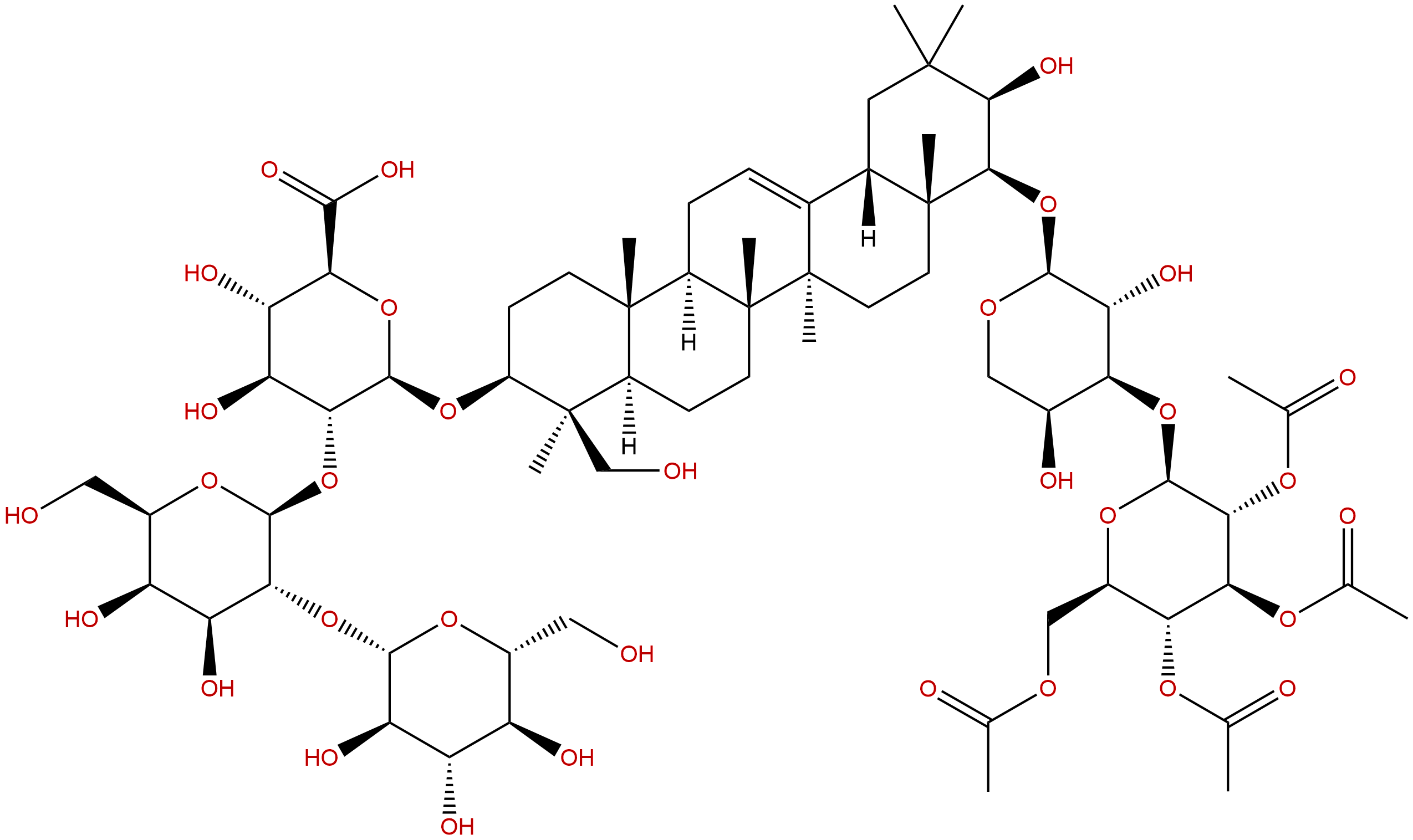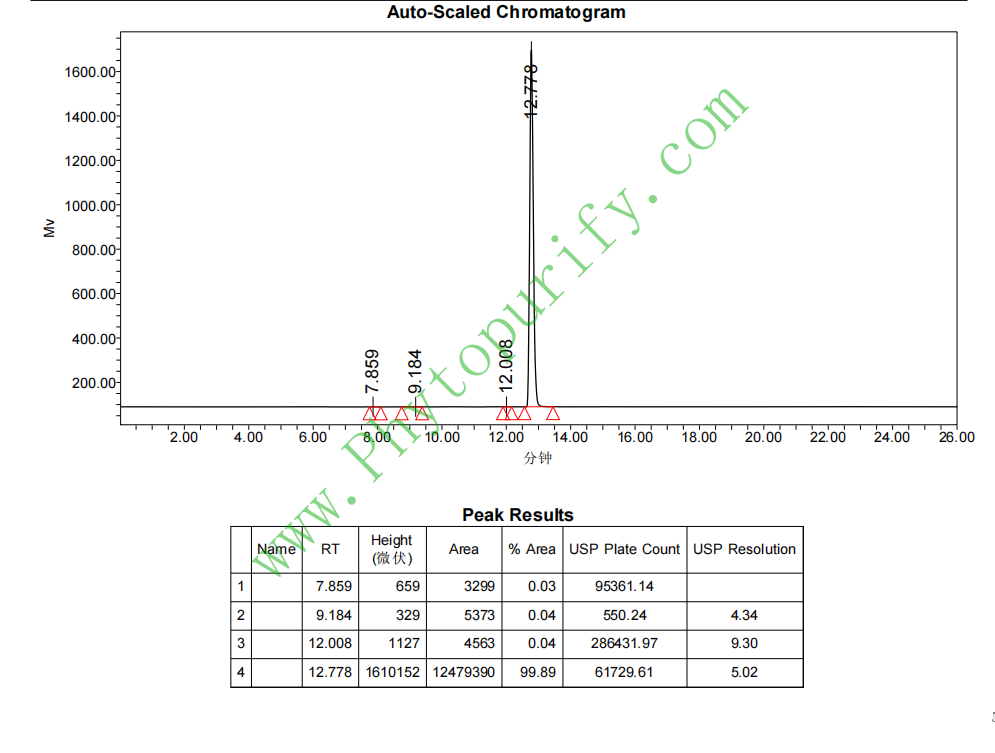
Soyasaponin AbCAS No.:118194-13-1
|
||||||||||
 |
|
|
||||||||

| Catalogue No.: | BP1735 |
| Formula: | C67H104O33 |
| Mol Weight: | 1437.54 |
Product name: Soyasaponin Ab
Synonym name: Acetylsoyasaponin A1
Catalogue No.: BP1735
Cas No.: 118194-13-1
Formula: C67H104O33
Mol Weight: 1437.54
Botanical Source: Glycine max (soybean)
Physical Description: Powder
Type of Compound: Triterpenoids
Purity: 95%~99%
Analysis Method: HPLC-DAD or/and HPLC-ELSD
Identification Method: Mass, NMR
Packing: Brown vial or HDPE plastic bottle
The product could be supplied from milligrams to grams. Inquire for bulk scale.
We provide solution to improve the water-solubility of compounds, thereby facilitating the variety of activity tests and clinic uses.
For Reference Standard and R&D, Not for Human Use Directly.
Description:
Soyasaponin Ab may represent a viable candidate for effective vaccine adjuvant, TLR4 receptor dependent pathway may be involved in immune stimulatory effects of soyasaponin Ab. Soyasaponin Ab has anti-inflammatory effects, it can inhibit colon shortening, myeloperoxidase activity, the expression of cyclooxygenase-2 (COX-2) and inducible nitric oxide synthase (iNOS), and activation of the transcription factor nuclear factor-κB (NF-κB); soyasaponin Ab (1, 2, 5, and 10 μM) can inhibit the production of NO (IC50 = 1.6 ± 0.1 uM) and prosta. Soyasaponin Aa and Ab can markedly inhibit adipocyte differentiation and expression of various adipogenic marker genes through the downregulation of the adipogenesis-related transcription factors PPARγ and C/EBPα in 3T3-L1 adipocytes. They also can prevent scopolamine-induced memory impairment in mice without the inhibition of acetylcholinesterase, exhibit memory-enhancing effects.
References:
J. Agr. Food Chem., 2011, 59(24):13165-72.
Soyasaponin Ab ameliorates colitis by inhibiting the binding of lipopolysaccharide (LPS) to Toll-like receptor (TLR)4 on macrophages.
Many clinical studies have shown that daily intake of soybean [ Glycine max (L.) Merr., Fabacease] or its foods may reduce the risk of osteoporosis, heart attack, hyperlipidemia, coronary heart disease, cardiovascular and chronic renal diseases, and cancers, including prostate, colon, and breast cancers. Of the soy constituents, soyasaponins exhibit anti-aging, antioxidant, apoptotic, and anti-inflammatory effects. However, the anti-inflammatory effect of Soyasaponin Ab has not been thoroughly studied. Therefore, we investigated its anti-inflammatory effects in 2,4,6-trinitrobenzene sulfonic acid (TNBS)-induced colitic mice and lipopolysaccharide (LPS)-stimulated peritoneal macrophages.
METHODS AND RESULTS:
Soyasaponin Ab inhibited colon shortening, myeloperoxidase activity, the expression of cyclooxygenase-2 (COX-2) and inducible nitric oxide synthase (iNOS), and activation of the transcription factor nuclear factor-κB (NF-κB). Soyasaponin Ab (1, 2, 5, and 10 μM) inhibited the production of NO (IC(50) = 1.6 ± 0.1 μM) and prostaglandin E(2) (IC(50) = 2.0 ± 0.1 ng/mL), the expression of tumor necrosis factor (TNF)-α (IC(50) = 1.3 ± 0.1 ng/mL), interleukin (IL)-1β (IC(50) = 1.5 ± 0.1 pg/mL), and toll-like receptor (TLR)4, and the phosphorylation of interleukin-1 receptor-associated kinase (IRAK)-1 in LPS-stimulated peritoneal macrophages. Soyasaponin Ab weakly inhibited the phosphorylation of ERK, JNK, and p38. Soyasaponin Ab significantly reduced the binding of Alexa-Fluor-594-conjugated LPS to peritoneal macrophages. Soyasaponin Ab did not affect TLR4 expression or LPS-induced NF-κB activation in TLR4 siRNA-treated peritoneal macrophages (knockdown efficiency of TLR4 > 94%).
CONCLUSIONS:
On the basis of these findings, Soyasaponin Ab may ameliorate colitis by inhibiting the binding of LPS to TLR4 on macrophages.
J.Agr.Food Chem., 2014, 62(9):2062-8.
Soyasaponins Ab and Bb prevent scopolamine-induced memory impairment in mice without the inhibition of acetylcholinesterase.
Soy (Glycine max, family Leguminosae), which contains isoflavones and saponins as main constituents, is known to exhibit memory-enhancing effects.
METHODS AND RESULTS:
Therefore, to investigate the role of soyasaponins in memory impairments, we isolated Soyasaponin Ab (SA) and soyasaponin Bb (SB) from soybean and measured their protective effects against scopolamine-induced memory impairment in mice. SA and SB significantly prevented scopolamine-induced memory impairment in passive avoidance and Y-maze tasks. Compared to SA, SB rescued memory impairment more potently. Treatment with SB (10 mg/kg, p.o.) protected memory impairment in passive avoidance and Y-maze tasks to 97% (F = 68.10, P < 0.05) and 78% (F = 35.57, P < 0.05) of untreated normal control level, respectively. SA and SB (10 mg/kg) also rescued scopolamine-induced memory impairment in Morris water maze task (F = 14.51, P < 0.05). In addition, soyasaponins preserved brain-derived neurotrophic factor (BNDF) expression (F = 33.69, P < 0.05) and cAMP response element-binding (CREB) protein phosphorylation (F = 91.62, P < 0.05) in the hippocampus of scopolamine-treated mice. However, SA and SB did not inhibit acetylcholinesterase in vitro and ex vivo.
CONCLUSIONS:
On the basis of these findings, we suggest that soybean, particularly soyasaponins, may protect memory impairment by increasing BDNF expression and CREB phosphorylation.
HPLC of Soyasaponin Ab
